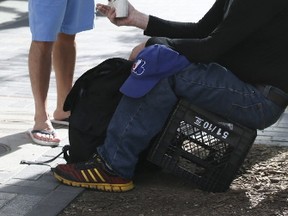Panhandling not a 'fact of life'

Article content
TorontoPanhandling is a “fact of life” in big cities and people should just “tune them out” if they don’t like it, says the lawyer leading the latest legal challenge against the Safe Streets Act (SSA).
“Traditional panhandling is unfortunately a fact of life in cities and to criminalize them (panhandlers) with the Safe Streets Act doesn’t eliminate it,” Peter Rosenthal recently told the Toronto Sun.
Heck, I can’t go on without injecting a dose of reality.
Why don’t we ask those who attended the same TD Jazz Festival concert I did in Yorkville Sunday evening whether they thought the clearly inebriated street-involved man taking swigs from the Listerine bottle was just a “fact of life” as he climbed on stage and tried to lunge at singer/trumpeter Bria Skonberg.
Should we have tuned him out, however sorry we might have felt for his circumstances?
Rosenthal, who is representing the Fair Change Community Legal Clinic in this second legal challenge, said they will be able to show the “striking” effects of the SSA over the last 15 years.
“(The Act has) caused a huge amount of problems for hundreds of panhandlers (in the way of convictions and fines) and hasn’t resulted in the collection of any fines,” he said. “It costs thousand and thousand of dollars in enforcement ... there’s no benefit from it at all.”
The Ontario Court of Appeal tossed out his first constitutional challenge in 2007 — which was filed shortly after the SSA was introduced.
The SSA, passed in 1999, was meant to curb panhandling and other aggressive forms of solicitation that threatened public safety.
It also prohibited pandhandling near ATMs, public toilets, taxi stands or bus stops, on public transit or in the roadway.
But the activists call it a “counterproductive way” to deal with poverty and claim many homeless and panhandlers are “forced to inhabit public spaces to meet basic needs such as sleep and income generation.”
Rosenthal said there’s a movement afoot to encourage the provincial government to repeal the Act instead of having to fight it out in court.
That move has the support of Osgoode Hall Law School Dean Lorne Sossin, who says in a statement that the SSA was an “ill-conceived attempt to criminalize the poor and marginalized and has been left on the books for too long.”
Sossin said Monday that the Ontario government is doing much — with its poverty reduction strategy — to improve the lives of “vulnerable people” impacted by the Act.
“I believe our goal should be a society where no one has to live/survive by panhandling,” he said in an e-mailed response, noting the Criminal Code addresses aggressive solicitation on our streets.
Guess none of them — Rosenthal included — ascribe to the “broken windows theory” which posits that preventing and dealing with the smaller crimes (including panhandling) will prevent the occurrence of more serious ones.
That said, Rosenthal and Sossin are remarkably naive about (or wilfully blind to) the lived experience of those who encounter panhandlers on Toronto’s downtown streets every summer.
Granted some panhandlers are polite and some are truly down and out.
But let’s be honest about who many of them are.
Some come to Toronto in the summer because they know the take is good and they won’t be harassed given the current “hug-a-thug” political climate from all three levels of government (yes, that means Mayor John Tory, too).
A good portion of them aren’t homeless. They aren’t marginalized. They have homes, some as we discovered over the years with flat-screen TVs and family in suburbia.
As I’ve said before, it’s not like plenty of money hasn’t been thrown at the problem, either — most especially from City Hall. In fact, as I learned last week, there’s now $17 million and an army of 90 (yes 90!) streets workers dedicated to getting the hardcore homeless off streets.
The budget keeps expanding, as do the social workers, even though the last homeless street count was four years ago and another won’t be done until next year.
Panhandling by the numbers:
- Current number of city workers devoted to getting homeless and (homeless) panhandlers off the streets: 90
- 2017 (Streets to Homes) budget for above: $17 million (includes programs operating at 129 Peter St.)
- Changes to program: Since 2013, city workers do not provide specialized services to panhandlers who have a home.
- Number of street-involved clients “encountered” in 2016: 1,512 (16 per worker)
- Number of that total who were panhandlers: 274
- Number of clients housed or rehoused: 516
Safe Streets Act
- Put in place: 1999
- Makes it illegal to solicit in an aggressive manner by:
- Threatening person solicited with physical harm
- Obstructing path of person solicited
- Using abusive language during solicitation
- Following person solicited after they’ve said no
- Soliciting under the influence of drugs or alcohol
- Makes illegal to solicit at following locations:
- At ATMs
- At a taxi stand or transit stop
- While on a public transit vehicle
- While on a roadway where a vehicle is stopped or parked










